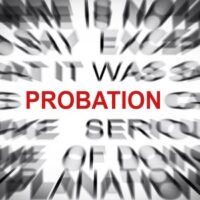Can I Be Forced to Testify in a Probation Violation Hearing?

If you are sentenced to a term of probation following a criminal conviction, you must strictly comply with all of the terms of release laid down by the court. Any probation violation, no matter how seemingly insignificant to you, can land you right back in court. The judge will then hold a hearing to determine if you committed a violation of the terms of your probation, and if so, whether that justifies sending you to prison to serve out the remainder of your original sentence.
Probationer Sent Back to Prison for Life Following New Violations
One question we often get about probation violation hearings is, “Can I refuse to testify?” After all, everyone has a Fifth Amendment right not to testify in a criminal investigation or trial. Does this same right extend to probation violation hearings?
The short answer is that a probationer only has a “qualified privilege against compulsory self-incrimination” in such situations. A recent decision from the Florida Third District Court of Appeals, Simmons v. State, offers a practical illustration of what this means. In this case, a probationer pleaded guilty in 2015 to burglary and battery charges. The trial court sentenced the probationer to 3 years in prison followed by 5 years probation. The court later extended this sentence after the probationer violated the terms of his probation following his initial release from prison.
After his second release from prison in 2021, a probation officer filed an affidavit alleging new violations. The affidavit alleged the probationer failed to obtain the probation officer’s consent before moving and refusing to provide his current location. Later, the state alleged the probationer committed additional crimes while out on probation.
The court held a probation violation hearing. The prosecution called the probationer to testify. The state did not ask the probationer about the new criminal allegations. Rather, the questioning was limited to the alleged non-criminal probation violations, i.e., whether he moved without notifying his probation officer. The state separately introduced additional evidence tying the probationer to the newly alleged crimes.
The trial court ultimately held the defendant violated his probation. The judge revoked probation and sentenced the defendant to life in prison on the original 2015 conviction. On appeal, the probationer argued the state violated his Fifth Amendment rights by forcing him to testify about his probation violations.
The Third District rejected that claim and upheld the trial court’s ruling. The appellate court noted that a “probationer may not refuse to answer a question, just because the answer would disclose a probation violation.” Accepting probation means waiving any Fifth Amendment privilege in this respect. A probationer can still invoke a qualified privilege to avoid confessing to any newly alleged crimes. But as noted above, the prosecutors here did not ask the probationer about any new crimes.
Contact AsiliA Law Firm Today
Probation is not, as many people think, a free ride out of jail. You can–and will–be sent back to jail if the state finds any reason to believe you are not following the terms of your release. That is why you need to work with a qualified Miami probation violation attorney who can defend your rights in court. Call AsiliA Law Firm today at 786-420-3014 or contact us online to schedule an initial consultation.
Source:
scholar.google.com/scholar_case?case=13804736374812230223
